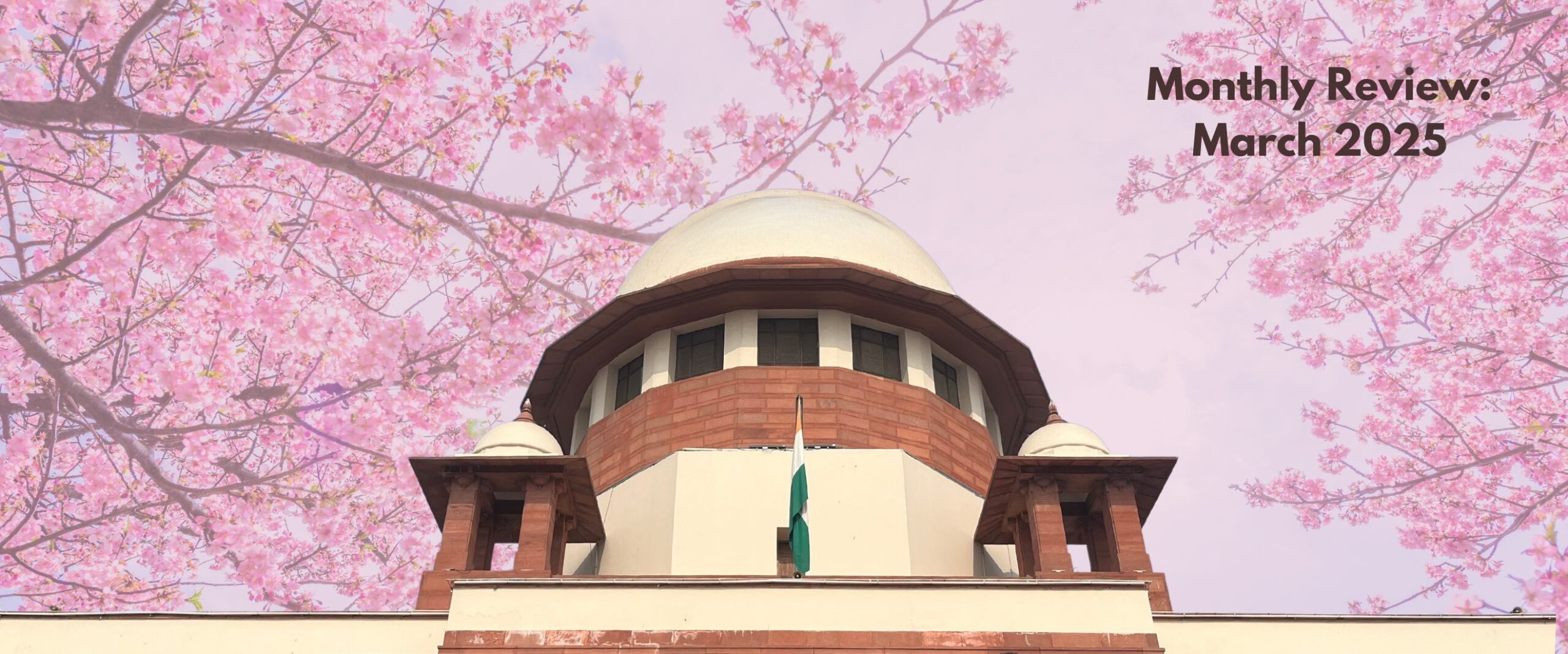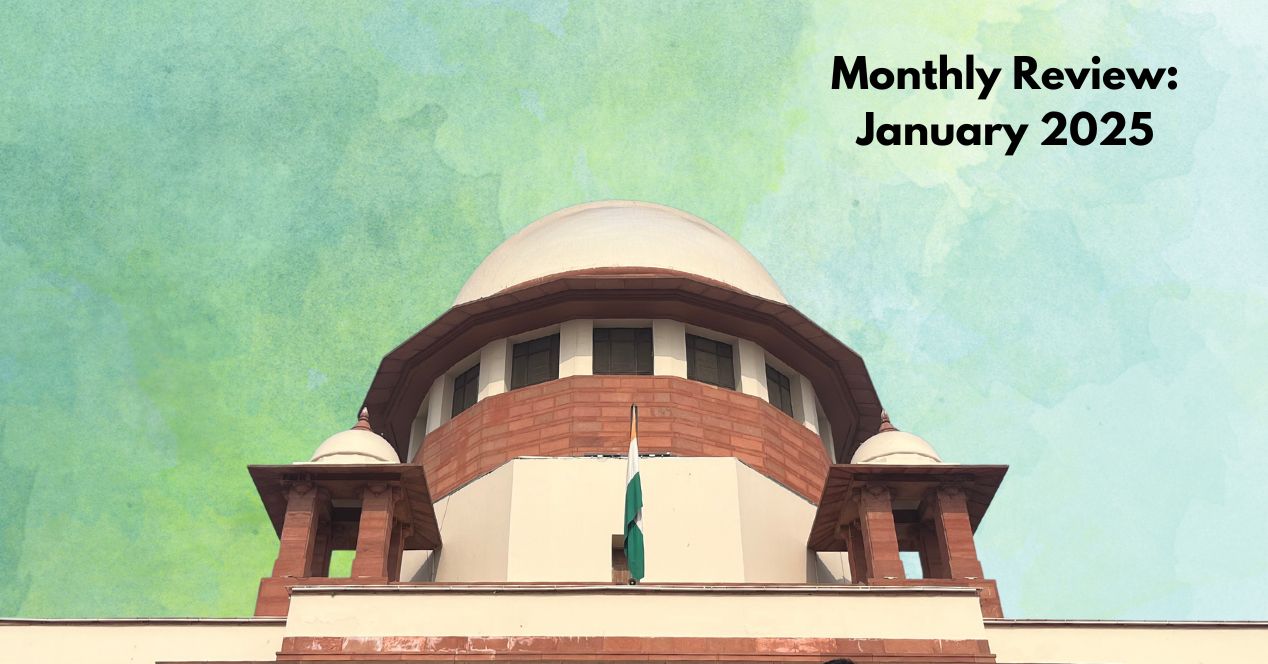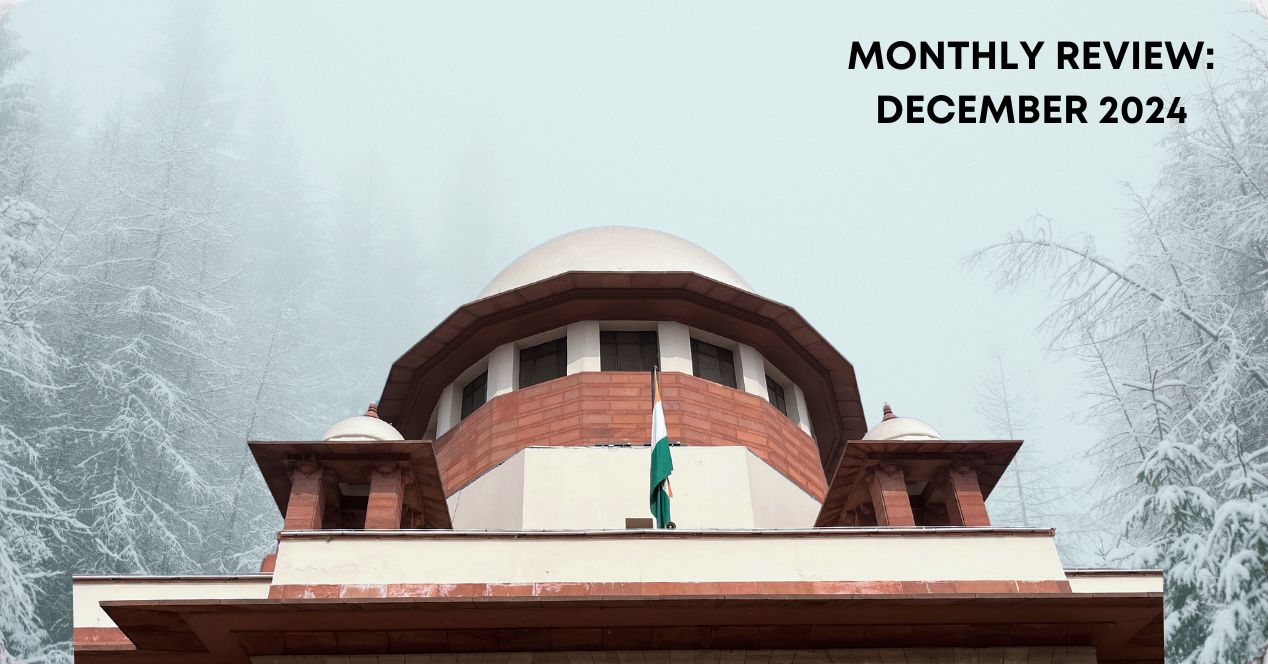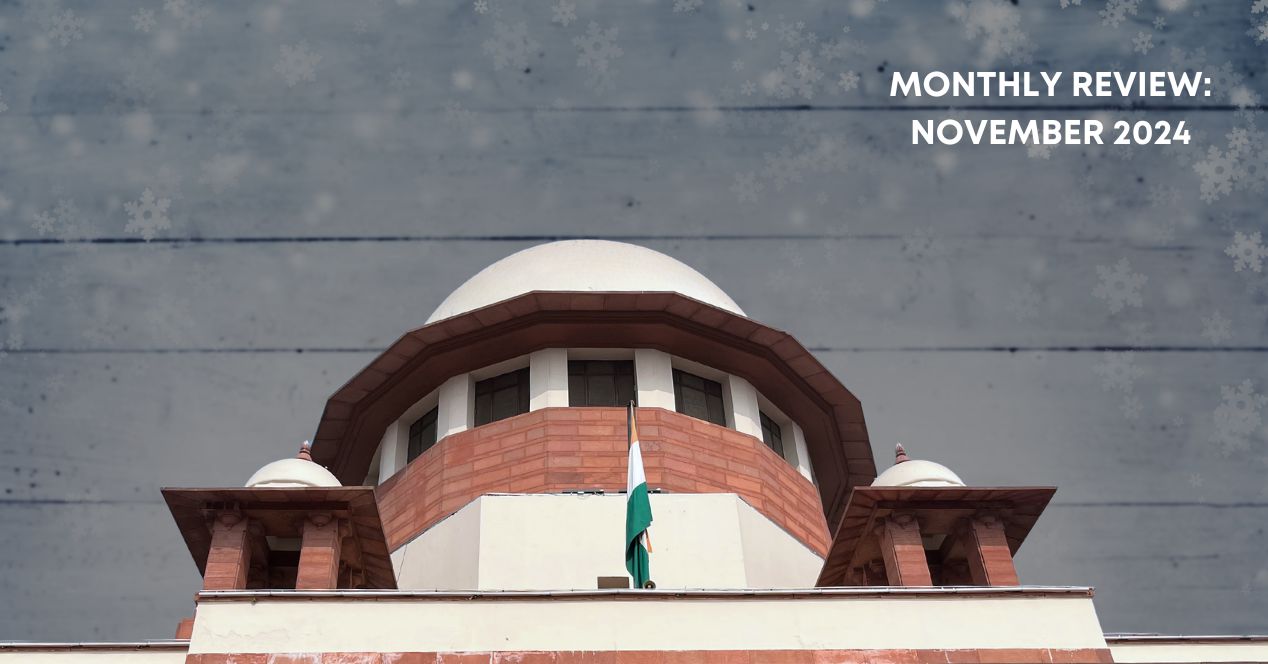Analysis
Monthly Review: March 2025
The SC reserved judgement in a key case on the designation of senior advocates and stepped in to address a cash controversy

In March 2025, judicial fraternity in Delhi were confronted by a cash controversy after unaccounted currency notes were discovered in Justice Yashwant Varma’s official residence in Delhi during a fire rescue operation. While the fire has since been dissolved, conversation on judicial accountability, appointments and transparency is still burning.
Regardless, the Court moved full steam ahead with its docket. It upheld a rape conviction from 2010 by reaffirming that the sole testimony of a prosecutrix was sufficient. The Court took up the case dealing with the jurisdiction of the Lokpal to investigate corruption against high court judges. It also reserved judgement in petitions demanding a review of the current process of designating Senior Advocates in the country.
Our monthly review of March 2025 covers all the developments.
Money troubles
On 22 March 2025, Chief Justice Sanjiv Khanna initiated an in-house inquiry and set up a three-member committee to investigate the ‘cash-in-outhouse’ controversy involving Justice Yashwant Varma. The committee was formed after nearly ₹15 crore of cash was discovered at Justice Varma’s official residence. The committee consists of Chief Justice Sheel Nagu, High Court of Punjab and Haryana, Chief Justice G.S. Sandhawalia, High Court of Himachal Pradesh and Justice Anu Sivaraman, Judge of the High Court of Karnataka.
The Collegium led by CJI Khanna also recommended the transfer of Justice Varma from the Delhi High Court to Allahabad High Court—his parent High Court. The transfer was notified by the Department of Justice on 28 March. Further, CJI Khanna also directed that no judicial work should be allotted to Justice Varma until the inquiry committee concludes its investigation.
Post the controversy, there have been conversations about transparency in judicial appointments, with chatter to bring back the National Judicial Appointments Commission. Our newsletter discussed how the conversation after the cash discovery should be about judicial accountability and not only appointments.
Her word is enough
On 7 March 2025, a Division Bench of Justices Sandeep Mehta and P.B. Varale reiterated that a prosecutrix’s statement was sufficient on its own to sustain a rape conviction. The judgement, authored by Justice Varale, dismissed an appeal against a rape conviction stating that the prosecutrix’s testimony was found to be “wholly trustworthy, unshaken, and inspiring confidence.” Further, the judgement observed that the “lack of injury to private parts” cannot be grounds to discard a testimony. The bench relied on State of Punjab v Gurmit Singh (1996) which discouraged repeated examination of a prosecutrix to search for minor discrepancies. It also relied on State of Maharashtra v Chandraprakash Kewalchand Jain (1990) which held that the Indian Evidence Act, 1872 does not mandate that a prosecutrix’s statement should be supported by other material.
Get on with “The Ranveer Show”
On 3 March 2025, the Supreme Court permitted YouTuber Ranveer Allahbadia, popularly known as “Beer Biceps”, to resume “The Ranveer Show” on his channel. In February 2025, a bench of Justices Surya Kant and N.K. Singh had prohibited Allahbadia from releasing any new episodes. This condition was imposed in his plea seeking the clubbing of FIRs registered against him over an incest joke made by Allahbadia on comedian Samay Raina’s show “India’s Got Latent.”
Advocate Abhinav Chandrachud, appearing for Allahbadia, had submitted that the livelihood of 280 people depended on the resumption of “The Ranveer Show”. The Court directed Allahbadia to submit an undertaking to maintain content suitable for all audiences and urged the Union government to frame narrowly tailored content guidelines without infringing upon free speech under Article 19.
Limiting the Lokpal reach
On 18 March 2025, a Special Bench comprising Justices B.R. Gavai, Surya Kant, and A.S. Oka heard a suo moto case to determine whether the Lokpal has jurisdiction under the Lokpal and Lokayuktas Act, 2013, to investigate corruption allegations against sitting high court judges. The root of the issue was a Lokpal Order dated 27 January 2025 which claimed that high court judges are under the jurisdiction of the Lokpal. The bench had stayed the order on 20 February. In the March hearing, the Court appointed an amicus to assist the proceedings.
Calling out insensitivity
On 17 March 2025, a Division Bench of Justices B.R. Gavai and A.G. Masih stayed a controversial Allahabad High Court judgement which had held that acts such as “grabbing of breasts” and “loosening of pyjama string” did not amount to an attempt to rape. The Supreme Court had taken suo moto cognisance of the case after the judgement made headlines for its observations. During the hearing, the bench described the comments by the High Court as totally insensitive and issued notices to the state of Uttar Pradesh and the parties who appeared before the High Court.
Reassessing the Senior Advocate Designation
A Special Bench of Justices A.S. Oka, Ujjal Bhuyan, S.V. Bhatti reserved judgement on whether the current system of designating senior advocates requires an overhaul or not. The present system was developed through the Indira Jaising decisions of 2017 and 2023. The Court heard arguments over two days on the fairness of the points-based system, the subjectivity of interviews and concerns around transparency and inclusivity by petitioners. The parties also proposed reforms such as eliminating interviews, adjusting the marking scheme and reinstating the secret ballot.
The Chief consideration
On 6 March 2025, the Supreme Court Collegium recommended the appointment of Justice Joymalya Bagchi of the Calcutta High Court as a judge of the Supreme Court. The resolution noted that Justice Bagchi would be in-line to become the Chief Justice of India in 2031. It also stated that there had been no Chief Justice from the Calcutta High Court since CJI Altamas Kabir, who retired in 2013. This was the first time the Collegium explicitly considered the ‘in-line to be CJI’ as a factor for appointment to the Supreme Court.
Fourth Branch institutions
In February, advocate and author Gautam Bhatia released a new book titled The Indian Constitution: Conversations with Power. The Supreme Court Observer published an excerpt from the book which revisits the Court’s decision in Anoop Baranwal v Union of India (2023). In Anoop Baranwal, a Constitution Bench had held that the appointment of the Chief Election Commissioner and the Election Commissioners shall be done by the President of India on the advice of a committee consisting of the Prime Minister, the Leader of the Opposition in the Lok Sabha, and the Chief Justice of India.
Bhatia discusses how the Constitution does not guarantee the independence of “fourth branch” institutions such as the Election Commission of India. He does this by pointing out how the Union government effectively nullified the Anoop Baranwal decision by passing the Chief Election Commissioner and Other Election Commissioners (Appointment, Conditions of Service and Term of Office) Act, 2023. The Act replaced the CJI with a member from the Union cabinet.
We also published an exclusive interview with Bhatia, on his new book, on our YouTube channel.
Media, gender and the judiciary
On 23 March 2025, Gauri Kashyap, Associate Editor, SCO moderated a panel discussion on the role of media in addressing gender disparities in the judiciary. The national consultation titled “Equal Justice: Securing Equal Inclusion of Women in the Higher Judiciary” was held in Bengaluru and was organised by the Centre for Law and Policy Research. Other members in the panel included Apurva Vishwanath, Journalist at The Indian Express, Vakasha Sachdev, Senior Manager, Government Affairs & Policy at Logically and Jyoti Yadav, Assistant Editor at The Print.
Analysis and commentaries
In February, the Court reinstated Sunil Kumar Singh back to Bihar’s legislative council. He was expelled for making derogatory remarks against Bihar’s Chief Minister Nitish Kumar. The Court relied on the doctrine of proportionality to reinstate Singh. In our analysis, we dive into the Court’s reasoning.
We also analysed a decision where the Supreme Court upheld the liberty of an accused, setting aside a High Court order that had stayed their discharge. It noted that discharge is on a higher pedestal than acquittal and cautioned appellate courts against restoring arrests lightly.
Lastly, we published a story on how a recent decision commuting a death sentence to life imprisonment without the possibility of remission was a missed opportunity for the Court to establish clear guidelines on this form of punishment. The ruling also made us revisit the role of mitigating circumstances in death penalty cases.




